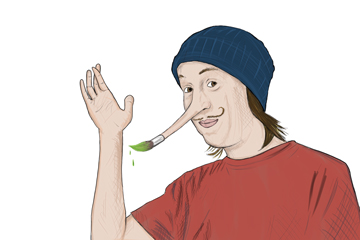Dishonesty increases creativity, study says

Lying and creativity linked
March 3, 2014
Society may frown upon dishonest behaviors, but two related Harvard studies have found that lying may increase creativity.
The studies conducted in 2012 and 2013 measured the relationship between dishonesty and creativity in people after they completed a series of activities that promoted dishonest behaviors and innovative ideas. Results showed an increase in creativity when the participants lied or cheated during the activities.
Francesca Gino, associate professor of business administration at Harvard Business School, and Dan Ariely, professor of psychology and behavioral economics at Duke University, conducted the first study measuring dishonest behavior in creative people. Creative types are better at justifying their unethical actions with unconventional ideas, according to Ariely.
Study participants were either asked to describe their level of creativity using three creative personality and behavior scales or they were assigned to a controlled scenario where creativity was not promoted for all subjects. They then participated in five experiments that measured dishonesty. In each experiment, participants who identified as being very creative or participated in the creative mindset scenario showed higher levels of dishonest behavior in the subsequent tasks.
Gino, along with Scott Wiltermuth, assistant professor of Management and Organization at the University of Southern California, revisited the idea that creativity and dishonesty are related in 2013. This time, the model was flipped, and creativity was measured in people who actively displayed dishonest tendencies. The study found participants who demonstrated greater dishonest behaviors were more creative in the required activities.
“If you break a rule, if you start behaving dishonestly, that’s going to really free up your mind … therefore, you’re going to be more creative,” Wiltermuth said.
In the 2013 study, participants performed similar activities to those in the 2012 study. The first experiment found that after participating in creative tasks, research subjects were more dishonest, corroborating the first study’s conclusion. The other experiments prompted participants to lie about their results after performing the different tasks before they completed an activity requiring creativity. Those who lied about their performance showed greater creativity, according to the study.
Money was used to encourage participants to lie about their performance following each task, Wiltermuth said. The more people lied, in general, the more money the research team gave them. Wiltermuth said money was used as an incentive because it is often valued by people in real-life situations.
According to Andy Yap, lecturer and post-doctoral associate at the Sloan School of Management at the Massachusetts Institute of Technology, dishonest behavior is not something people engage in for fun, but rather in order to get something they want. In the study’s case, participants wanted money.
“They think it’s a game,” Yap said. “For some reason they’re not able to [get what they want] through honest means.”
Wiltermuth said he thinks it is important to note that the research team is not suggesting people should lie more often, but the study results promote a rule-breaking mindset that may increase creativity.
Yap also noted that the increase in creativity depends on the success of a person’s dishonest behavior. He said the effectiveness of a lie may be situational. In places where systems are in place to prevent lying and unethical behaviors, such as corporate settings and schools, it is more difficult for a person to lie effectively.
Dishonest behaviors such as white lies are often easier to discern because people rationalize their behavior, Yap said. He also also discussed indicators that can expose someone’s dishonesty. Yap said when people lie, they try to suppress nonverbal behaviors.
However, suppressing such behaviors actually creates what researchers call a nonverbal leak. This leak could involve changes in body language such as a pursing lips or hesitant speech, Yap said.
“Because you’re thinking about lying … and what’s going to happen if you lie, these [leaks] will actually reveal themselves,” Yap said.
Lying can also have a significant impact on mental health, according to David Kroll, clinical health psychiatrist at Brigham and Women’s Hospital in Boston.
He said in most people, dishonest behavior may make them anxious in certain situations. Increased anxiety levels can lead to more stress, which can contribute to serious medical conditions, Kroll said.
“There are people who don’t get anxious when they lie,” Kroll said. “For those people, it wouldn’t necessarily cause them large scales of stress.”
Dishonest behavior can also lead to social setbacks because people who get caught in a lie may lose their credibility and damage their reputation, potentially destroying relationships, Wiltermuth said.
However, whether or not dishonest behavior should be avoided is situational and is ultimately a question of morality, Kroll said.
“There are certain situations where avoiding certain uncomfortable situations by lying could help avoid a special encounter,” Kroll said. “Lying is a heterogeneous phenomenon because people experience lying in different ways and tell things to different people.”







